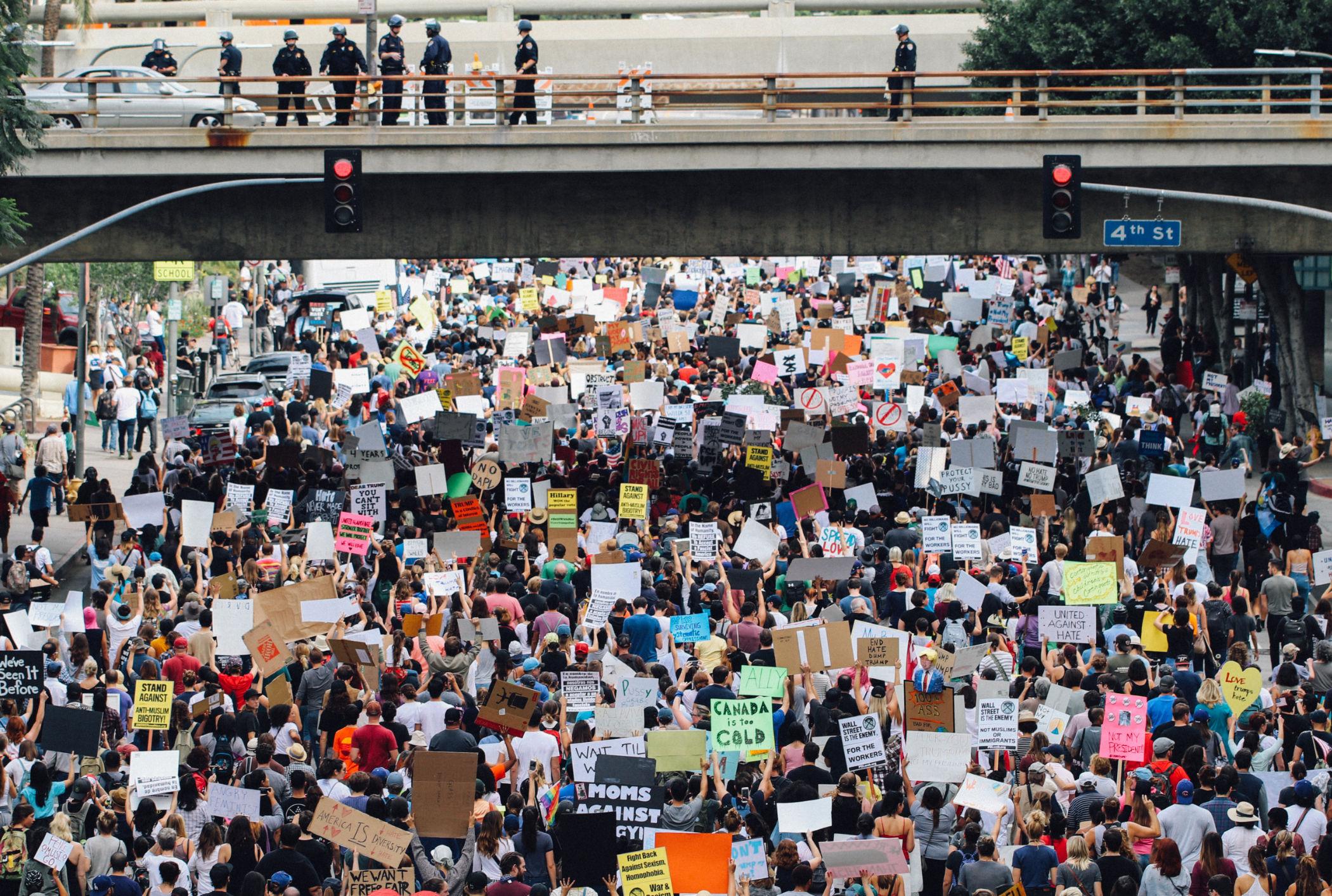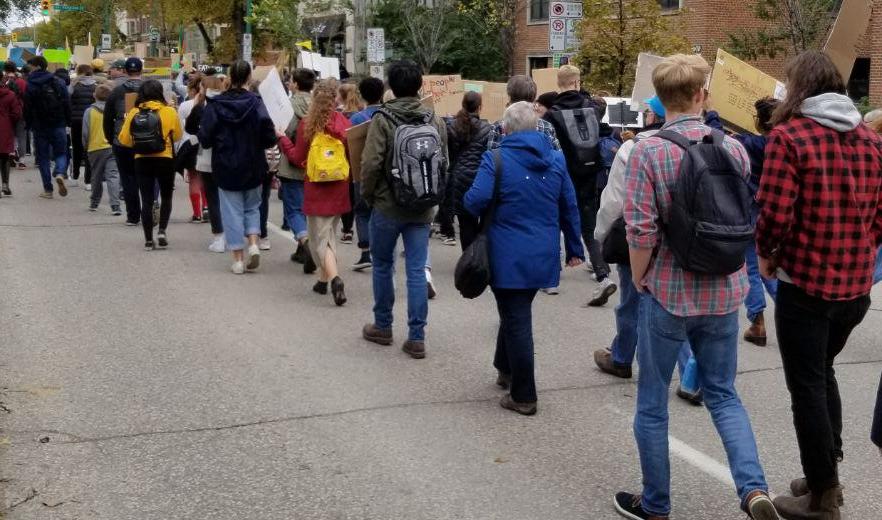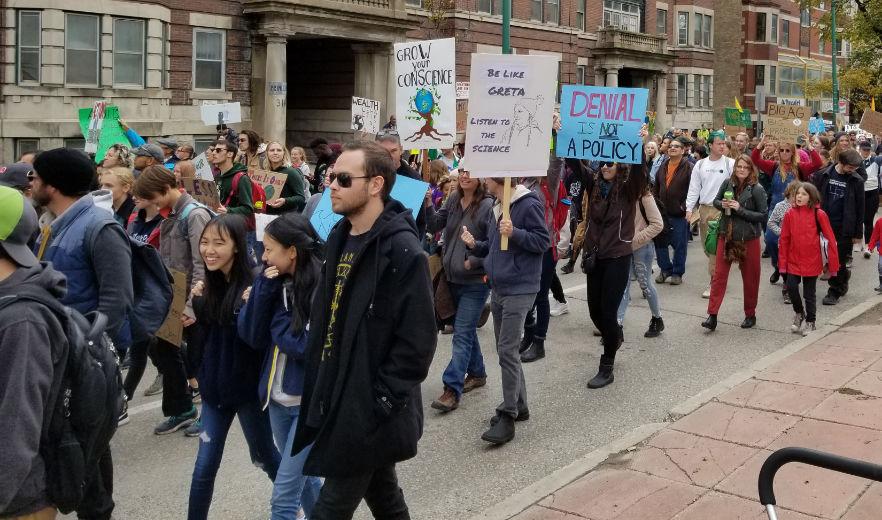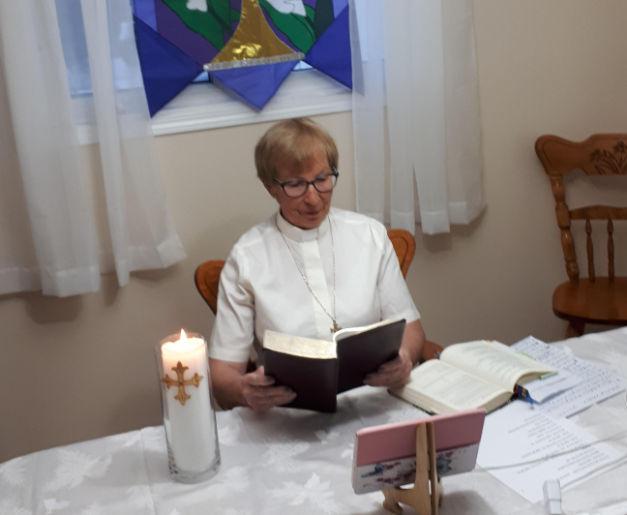
12 minute read
Walking, Marching, Protesting
from May Magazine 2020
by rlandnews
Walking, Marching, Protesting Hannah Foulger
Photo: Alex Radelich
Advertisement
In this time of social distancing, we may think wistfully back to the days when we were able to congregate in church, in theatres, and in protest. It was only six months ago that people from all strata gathered at the Manitoba Legislature for the Strike for Climate Action, inspired by Greta Thunberg. That march feels like a thousand years ago. Gathering and moving together feels like a memory or a dream these days. But there was once a time when people gathered together to march for political and climate action, Pride, water sovereignty, and Missing and Murdered Indigenous Women and Girls. What’s often key in protests, and what is most exciting, is the walk, parading down Broadway, or, in the more exhilarating circumstances, blocking off Portage and Main for the parade or for a round dance. More often, these routes are chosen for their accessibility to those with mobility aids, canes, walkers, and wheelchairs, who may not march the route, but parade with us nonetheless. But, despite what the pictures tell us, disability is more than wheelchairs and walkers. It’s chronic illness. It’s neurodiversity. It’s being deaf. It’s having a brain injury. Many rallies and marches are organized without adequate funding for an ASL interpreter, and there are many who are unable to handle the raw intensity of a protest. All aspects of the protest, parade included, can be exclusive to those with invisible injuries. “I have missed out on almost every protest since my brain injury,” Jane Orion Smith says. Smith is a Winnipeg Quaker who used to work as a stage designer at Buddies in Bad Times.

“I made it to Pride for a bit in 2017 –because, compared to Toronto, Winnipeg seemed like it would be at least a viable outing! Most of my social action work was rooted in my writing and advocacy behind the scenes, not out in the street. I no longer have the capacity to think through issues or communicate them in writing, in the kind of clear way needed, nor the energy to sustain myself on an ongoing issue. My brain feels like it’s going to explode within a half hour of actually ‘thinking.’
“Pivoting to do in-the-streets protests as an alternative to the more cerebral work of yore is also tough – lots of noise, lots of people, lots of stimulation. Attending any protest is going to cost me – and I won't know how much until two days later. Pain. Fog. Fatigue. Cognitive difficulties. The list goes on. At the time, I get disoriented, can have balance problems, certainly aphasia. I get overwhelmed quickly and have a hard time making decisions –which means I always need to go with a support person when I go to a public event. And being able to go means I have to be having a ‘good day.’ I really pay if it’s not a good day and I push myself.”
Smith isn’t alone in this struggle. Johanna Hedva is a writer and academic who lives with chronic illness. In 2014, she wrote an essay called “Sick Woman Theory” for Mask Magazine, questioning Hannah Arendt’s proposal that the political is any action performed in public, and how someone who cannot march in the parade, hold a sign, or shout a slogan can participate in protest: “If being present in public is what is required to be political, then whole swathes of the population can be deemed a-political – simply because they are not physically able to get their bodies into the street.” Indeed, we are all suddenly finding ourselves in the same boat – unable to gather, unable to venture outside except for necessities, unable to show up at the Leg and tell Brian Pallister exactly what we think he should be doing. Instead, all the forms of protest that have been disregarded at times –social media activism, slacktivism, Tweeting for the cause – have become our only forms of protest. We carry on and hope that our voices will be recognized just as much as they would be if our politicians saw us from their offices.


Climate Strike, 2019


How do we engage when we can’t physically engage in the march? “How I have decided to stay engaged, at this moment in time, is to be supportive of the people that have the capacity and energy and ability to do it. You could say I have moved more into a more pastoral care role,” Smith says. “Given most of my social action work was within a faith-based setting over the past 20+ years, this seemed a natural transition. By being a listening ear, a caring presence (even if that means only via text, email, or phone), a supporter of their work, I know I am making a contribution of value – because people used to do this for me. Often they were older folks who were no longer as active. They provided a model. And I can only read or be on a computer so much (planning and pacing is the order of the day for me every day!), so actual involvement seems like a future goal right now.” I am seeing every day the kind of mutual and pastoral care offered to people at this time. People on Facebook have bought groceries for complete strangers. Handed out toilet paper. Radical expressions of love from people with mobility and those with reduced mobility.

As Hedva writes in “Sick Woman Theory,”
“The most anti-capitalist protest is to care for another and to care for yourself. To take on the historically feminized and therefore invisible practice of nursing, nurturing, caring. To take seriously each other’s vulnerability and fragility and precarity, and to support it, honour it, empower it. To protect each other, to enact and practice community. A radical kinship, an interdependent sociality, a politics of care.”
We may not be able to walk or parade together, but we can learn something from those who have been in protest of harmful systems and support each other with the love and care Jesus showed us.

Hannah Foulger is a British Canadian theatre artist and writer. Her disability poetry has been published in Blue Mountain Press’ Disabled Voices anthology and performed in Sick + Twisted Theatre’s Lame Is... cabaret. Her plays Clink and My Frozen Heart: A Comic Tragedy have been produced at the Winnipeg Fringe Festival. She lives on Treaty 1 Territory in Winnipeg, Manitoba.
Online Services Around the Diocese These parishes are offering online worship services. • All Saints, Winnipeg: Service recordings are available on YouTube. • St. John’s Cathedral: Live streams on
Sundays at 10:30 a.m. • Emmanuel Anglican/United Church,
Ignace, ON: Live streams Sunday mornings at 10:00 a.m. and Sunday evenings for
Compline at 9:00 p.m. • St. Aidan's, Winnipeg: Service recordings are available on YouTube. • St. Thomas, Weston: Live Streams on
Sundays at 10:00 a.m. • St. Luke's, Winnipeg: Recordings of the
Daily Offices are available at their website.
Live streams on Sundays at 10:30 a.m. • St. Chad's, Winnipeg: Lives streams
Morning Prayer at 9:30 a.m. on Sundays. • St. Mark's, Winnipeg: You can join a free teleconference call on Sundays at 10:00 a.m. | Call Number: +1 867-292-3030 |
Code: 531-9209#. • The Anglican Lutheran Centre: Sunday services with Bishop Geoff can be found on Twitch at 10:00 a.m.
• St. Alban's, Kenora: Live streams on
Sundays at 10:00 a.m. • saint benedict's table: Live streams
Evening Prayer at 5:00 p.m. daily. | Sundays at 7:00 p.m. • St. James, Winnipeg, and St. Stephen and
St. Bede: They will be alternating live streamed services from their locations: St. James: May 3, 17 and 31 at 9:30 a.m. St. Stephen and St. Bede: May 10, 24 at 11:15 a.m.
• St. George's, Crescentwood: Live streams on Sunday mornings at 10:30 a.m.

• St. Saviour's, Winnipeg: Recordings are available at their website.
• St. George's, Transcona: Service recordings are available at their website.
Rev. Canon Jeanne Bryan leads Sunday worship from her home for Emmanuel Anglican/United Church in Ignace, Ontario.
The Winnipeg Free Press recently published a piece about how Winnipeg churches were celebrating Easter online, and included a look at Holy Trinity’s service with Cathy Campbell and Donald McKenzie. “Scattered within the pews, with several metres separating them, are Richard Greig, a Scotsman who’s played the church’s 4,600-pipe organ since 1997; Johanna Mast-Kolb, a cheery Sunday-school teacher; and the Rev. Donald McKenzie, an affable man in blue shirtsleeves with shaggy, greyish hair. On this day, the trio make up [Cathy] Campbell’s de facto film crew as she produces what will be a Saturday evening address to the Holy Trinity congregation, sent out ahead of Easter Sunday: Greig is providing the soundtrack, Mast-Kolb is doing a bit of prop work and backup vocals, and McKenzie is the gaffer, the cameraman, and the lighting technician. ‘What I want to do isn’t to recreate a service,’ Campbell tells the group. ‘We don’t have the capacity for that, and to me, it would feel wrong.’ What she wants is to offer some sort of reminder that even if a congregation can’t exactly congregate, the church is still a rock, it is still standing there.” Read the full article here. The Canadian Foodgrains Bank has put together a prayer resource for this time. It’s available at their website or as a downloadable pdf. Prayer for leaders and those giving care Thank you, Creator, for all forms of governments and leaders around the world. Lead them as they determine how best to govern in these uncertain times. Let this be a time of care, not fear. Unite them and us in this time where we are seeing that borders mean nothing. Form their leadership and decisionmaking with mercy, compassion, and wisdom. Please be with all of the emergency responders, doctors and nurses, and others whose service is essential. We are grateful for all those who stock the shelves at the grocery store and help keep things as normal as possible. Cover all those who are exposing their own health to save others. Protect them physically and emotionally. Guide their hands and give them wisdom. Protect their families as they spend extended time away from home. In Jesus name we pray, Amen. COVID-19 Update from PWRDF
The Primate’s World Relief and Development Fund [has announced] a plan to allocate $200,000 to respond to COVID-19 around the world and in Canada. The money will be spread across four partners: Village Health Works (Burundi), Partners in Health (global response), ACT Alliance’s Global Appeal and HelpAge Canada, supporting vulnerable seniors here. To address the needs of underserved communities in developing countries, PWRDF has granted $60,000 each to Partners in Health and Village Health Works. Both are long-time partners of PWRDF and are well placed to support people dealing with COVID-19. PIH Rwanda and VHW have been key partners in
PWRDF’s All Mothers and Children Count program, supported by tens of thousands of Canadians and with funding from the Government of Canada. “As always, we are heartened by your solidarity, support, compassion, and tenacity,” writes Cathryn Christensen, Clinical Partnerships Director at VHW. When VHW first reported back to PWRDF on March 19, there were no identified cases of COVID-19 in Burundi, and 11 cases in Rwanda. Since then, Christensen notes two cases of COVID-19 have been diagnosed in Bujumbura, Burundi. There are now 75 cases in Rwanda. These numbers can be partly attributed to low rates of testing and access to tests. Health care professionals at VHW are concerned they don’t have sufficient equipment or staff if COVID-19 infections follow a trajectory similar to that of Italy, Spain or the United States. “There are fewer than 10 ventilators in all of Burundi (with a population of more than 11 million people) and, as we know, the health system’s capacity is challenged even without the additional threat of a pandemic,” says Christensen. “Our sewing co-op face masks, made from local kitenge fabric, have since been improved.” Given the lack of ICU beds, personnel and treatment options, VHW’s strategy is in line with Burundi’s Ministry of Health and will focus heavily on containment efforts. Initial measures will be education, prevention and protection, with the goals “to protect patients, health workers, the population (including workers who are building our urgently needed hospital), and to treat what we can treat,” says Christensen. A further allocation of $40,000 will contribute to the ACT Alliance Global Appeal to support organizations building awareness about COVID-19 and working closely with health officials to prevent fatalities and intense pressure on already fragile public health systems. The global budget for this appeal is $12 million U.S. Major vulnerable groups of people are in countries where PWRDF works, such as the Rohingya refugees in Cox’s Bazar, Bangladesh, and migrants in Venezuela, Syria and other places. ACT notes that infections are “expected to rise exponentially” when COVID-19 hits small shelters and holding and detention centres. “The work of our global partners to respond to this pandemic is critical right now,” says Will Postma, Executive Director of PWRDF. “They are helping the most vulnerable in areas where even the basics of soap, running water and two metres of physical distancing can be a luxury.” To support needs in Canada, PWRDF is also allocating $40,000 to HelpAge Canada to support vulnerable seniors in Canada coping with COVID-19. HelpAge Canada provides grants to organizations across Canada who are responding to seniors who are at the highest risk of COVID-19 infection. Initiatives include providing food, medications, personal care as well as supporting those who are putting themselves in harm’s way to care for them. HelpAge Canada has raised almost $110,000 towards its COVID-19 appeal, including the gift from PWRDF. It continues to expand its partnerships with agencies across Canada. “We are grateful and humbled to receive this grant and to work together to serve the most vulnerable among us,” says Gregor Sneddon, Executive Director of HelpAge Canada and coincidentally, a former Anglican priest in the Diocese of Ottawa. “We are excited to work together on this project and maybe more in the future.” The economic fallout of COVID-19 has been devastating, for some more than others. We encourage you to do what you can to support PWRDF and our partners, both in Canada and around the world during this unprecedented global crisis. Please hold in your prayers those who are unwell, vulnerable to illness, facing financial uncertainty and for whom physical distancing is not possible. We continue to lift up our hope for a more just, peaceful and healthy world. –Janice Biehn, Communications Coordinator, April 1, 2020



